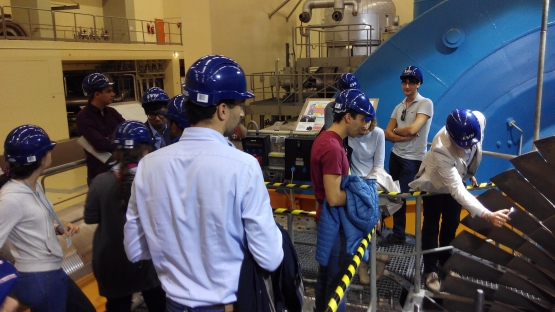Highlighting the necessity of attracting young people to the nuclear field, the IAEA Department of Nuclear Energy hosted for the fourth time a ceremony to honour 22 graduates of the European Master of Science in Nuclear Engineering (EMSNE) programme.
"We need to transfer knowledge and skills to new generations," said Mikhail Chudakov, IAEA Deputy Director General and Head of the Department of Nuclear Energy, before presenting the graduates their awards. "This will help the nuclear sector avoid gaps in the workforce who shall develop new designs and take care of the existing facilities throughout their design life."
At a ceremony jointly held with the European Nuclear Education Network Association (ENEN) on 17 September 2015 during the 59th IAEA General Conference, Mr. Chudakov welcomed the graduates to the global community of nuclear professionals.
Also addressing the 11th batch of EMSNE graduates, ENEN President Walter Ambrosini emphasized that the programme also helped strengthen the cooperation between the IAEA and the regional networks in nuclear education and training.
John de Grosbois, Head of the IAEA's Nuclear Knowledge Management Section, encouraged the laureates to make it a priority to strive for quality and excellence. "You should always be ready to learn, not only from successes but also from mistakes," he said.
In addition to meeting many experts in the nuclear field during the General Conference, the laureates also had the opportunity to visit the Zwentendorf nuclear power plant, a complete but never-operated boiling water reactor some 60 km north-west of Vienna.
Background
The objective of the EMSNE programme, organized by ENEN, is to develop an international network of high quality nuclear engineers and scientists by educating students to become analytical, resourceful and inventive nuclear engineers.
ENEN was established in 2003 as a non-profit organization on the basis of the European Higher Education Area. It is a major actor in the coordination of nuclear education and training funded by the European Commission. ENEN's objective is to preserve and further develop expertise in the nuclear fields through higher education and training.
A Practical Arrangement was signed between the IAEA and ENEN for research, education and training in nuclear technology. During the past years, the IAEA Member States have benefited from sharing the experience and best practices of ENEN and its accreditation system through shared activities.
To achieve a strong level of cooperation, the agreement also strives to support the activities of other educational networks, such as ANENT (Asian Network for Education in Nuclear Technology), AFRA-NEST (African Network for Education in Nuclear Science and Technology), LANENT (Latin American Network for Education in Nuclear Technology) and the recently established STAR-NET, which brings together 12 universities from six countries in Eastern Europe and Central Asia.


